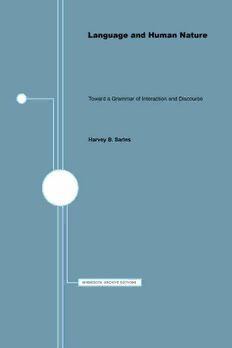
Language and Human Nature: Toward a Grammar of Interaction and Discourse PDF
296 Pages·1985·15.686 MB·
Most books are stored in the elastic cloud where traffic is expensive. For this reason, we have a limit on daily download.
Preview Language and Human Nature: Toward a Grammar of Interaction and Discourse
Description:
Language and Human Nature was first published in 1977 as After Metaphysics: Toward a Grammar of Interaction and Discourse and was reissued under the present title in 1985. Language, in Western thought, is the major metaphor for all that we consider truly and uniquely human. It is what separates us from other species and makes human society possible. Language has been taken to be an aspect of the mind -- the seat of logic, rationality, and objectivity; study of language has focused on its formal aspects -- structure and grammar. In recent years, language has come to seem an independent object, unconnected to either our bodies or the world around us. In Language and Human Nature, Harvey Sarles challenges those views of language; his aim is to explore the foundation of the concept of language and to suggest alternative ways of thinking about both language and what is human in human nature. The subjects of these fourteen essays range from the unexamined assumptions embedded in the academic discipline of language study, to the dynamics of facial expression, to the question of whether an extraterrestrial being could discover human language; but two themes emerge: First, the Western notion of language historically has been used to justify or defend particular political, religious, and metaphysical theories. Its use as the definition of "humanness" has profound implications for our relations with those excluded -- other species, and humans with impaired language ability. Second, the focus on the mind has led to a narrow definition of language that ignores the enormous communicative power of the body. Recognition of the body's role allows language to be defined more broadly as communication and interaction. The reification of language in the traditional approach, Sarles argues, has severely limited research and has led to static formulations of linguistic and social problems. Language and Human Nature was first published in
See more
The list of books you might like
Most books are stored in the elastic cloud where traffic is expensive. For this reason, we have a limit on daily download.
